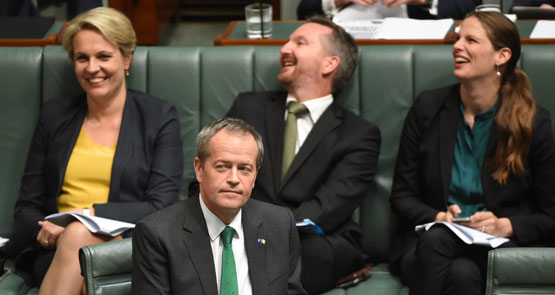
“Let’s be content, and the times lament, you see the world turn’d upside down.”
— English Civil War ballad
Politics in 2016 is not so much playing out unexpectedly as entirely opposite to expectations. Indeed, it has completely inverted what appeared to be the natural order of things — this week above all.
The sight of both the Greens and Labor voting in the Senate against bringing on a same-sex marriage bill, while attacking each other for failing to support it, was only the most trivial example of role reversals — as is the government refusing to bring on its own Australian Building and Construction Commission bill, which it wants to use as a double dissolution trigger, for a vote.
Much more significant was the contrast between Opposition Leader Bill Shorten and Prime Minister Malcolm Turnbull.
Last year, the core narrative of Australian politics was that the restoration of Turnbull to the Liberal leadership set the nation up for a period of moderate, intelligent leadership by a charismatic, popular leader (aided by a Treasurer who had proven himself skilled at difficult portfolios) who would easily see off a plodder like Shorten. Shorten’s leadership itself could’ve been in danger — especially given his voter approval numbers were (and are) abysmal. The only thing that seemed to save him was that no one else in Labor thought they had a chance against Turnbull.
But this week, it was the stolid Shorten who looked the confident leader of a united party offering substance and intelligent policy. He has a suite of solid tax policies under his belt and a shadow Treasurer who is demonstrating why so many people inside and outside Labor have long rated him so highly. Shorten went to the Press Club and spoke about unemployment and underemployment; the following day he launched a paper by opposition spokesperson on families and payments Jenny Macklin on inequality. Those godawful zingers have been curtailed; he still uses them, but they’re better, and better delivered. He looks and sounds more natural.
Meantime Turnbull faced an outright rebellion by the lunatic right on Safe Schools, including by Tony Abbott, under whom Safe Schools had been launched. Turnbull himself has said nothing while the most vile comments have been uttered by his own backbenchers. The far right, it appears, now has more power in the government than it did under Tony Abbott. Turnbull’s Treasurer had to admit the core rationale for tax reform as spruiked by the government for so long — personal income tax cuts — weren’t likely to feature in the “tax reform package”. To give the impression of an active agenda in the absence of meaningful tax reform, Turnbull held a media conference to announce some board appointments, then complained when journalists asked about other topics and walked out. Then the government backflipped and handed the Nationals a win on an effects test in competition law, which the economic hard heads in the Liberal Party oppose.
That in itself confirmed another contrary development: the Business Council of Australia is on a serious losing streak, having failed in its quest to impose a higher GST on the rest of us while slashing corporate taxes for its big business members, and now losing out on an effects test. While lower taxes might be a permanent hope of the BCA, it has fought an effects test ferociously — something that presumably is unrelated to Richard Goyder, CEO of Wesfarmers, being on the board of the BCA. The once-influential BCA is starting to look politically toxic — and Liberal powerbroker Michael Kroger’s call for CEO Jennifer Westacott to resign is looking more and more on-point.
Beyond all that, the government’s drift and indecision has carried it back to parity with Labor in the polls and dented Malcolm Turnbull’s standing with voters. There’s no one in Canberra who will tip a Labor win, currently — the expectation is the government will get back with a diminished majority. But when an opposition purposefully leads the policy debate over a confused government; Bill Shorten and Malcolm Turnbull trade places; the right is allowed to run rampant by a moderate leader; and one of the Liberal Party’s biggest business allies appears to have a reverse-Midas touch, we’re living in confusing times indeed.








Again, it’s taken Kroger and others long enough to wake up to Westacott – perhaps she has outgrown her usefulness?
[ There’s no one in Canberra who will tip a Labor win, currently —]
LOL. Never say never. As someone said not so long ago
The Evil of Two Lessers (who think that they are permanent Lessees).
Once there was the Greens to keep hope alive but the descent of the Abominatio0n, the Black Wiggle, determined to be the Cheryl Lees/Meg Kernow du jour and destroy his party when it is needed most, we are facing a bleak future indeed.
Kick out the Jams, Eat the Rich, everything 60s is now more urgent than ever.
Labor’s “not good with money”. True or false?
Until Labor has a reasonable comeback for this, the Australian public will not trust them to manage the economy.
Perception is everything.
Angela – alas you are correct, “Perception is everything.“, that facts be buggered.